Sustainable Tourism Development in the UK: Principles, Stakeholders, and Macro Environmental Trends
VerifiedAdded on 2023/06/07
|8
|2463
|352
AI Summary
This essay explores sustainable tourism development in the UK, including its principles, stakeholders, and macro environmental trends. It discusses the benefits of sustainable tourism, the role of stakeholders, and the impact of macro environmental forces on the industry.
Contribute Materials
Your contribution can guide someone’s learning journey. Share your
documents today.
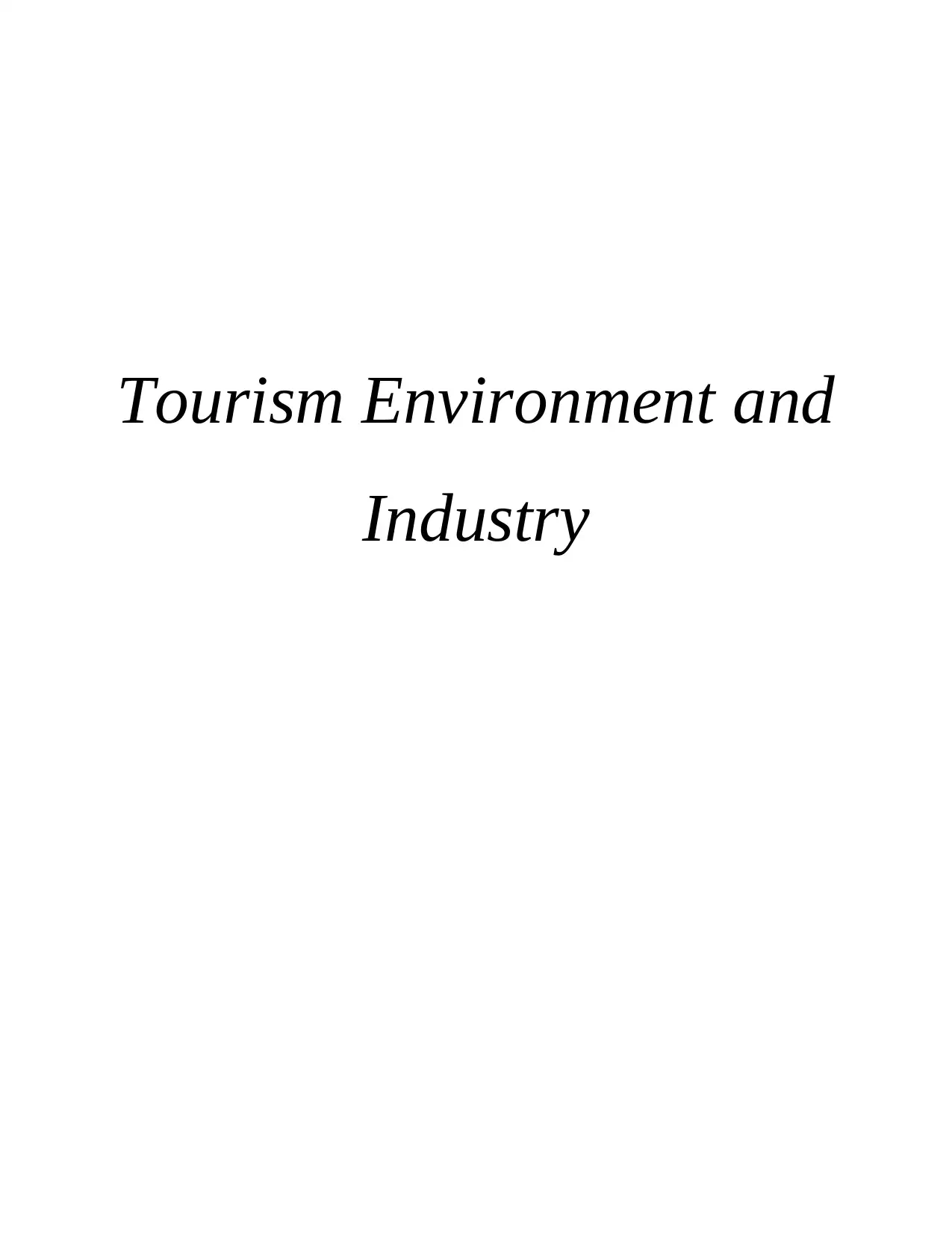
Tourism Environment and
Industry
Industry
Secure Best Marks with AI Grader
Need help grading? Try our AI Grader for instant feedback on your assignments.

Contents
INTRODUCTION...........................................................................................................................1
MAIN BODY ..................................................................................................................................1
CONCLUSION ...............................................................................................................................4
REFERENCES................................................................................................................................4
INTRODUCTION...........................................................................................................................1
MAIN BODY ..................................................................................................................................1
CONCLUSION ...............................................................................................................................4
REFERENCES................................................................................................................................4
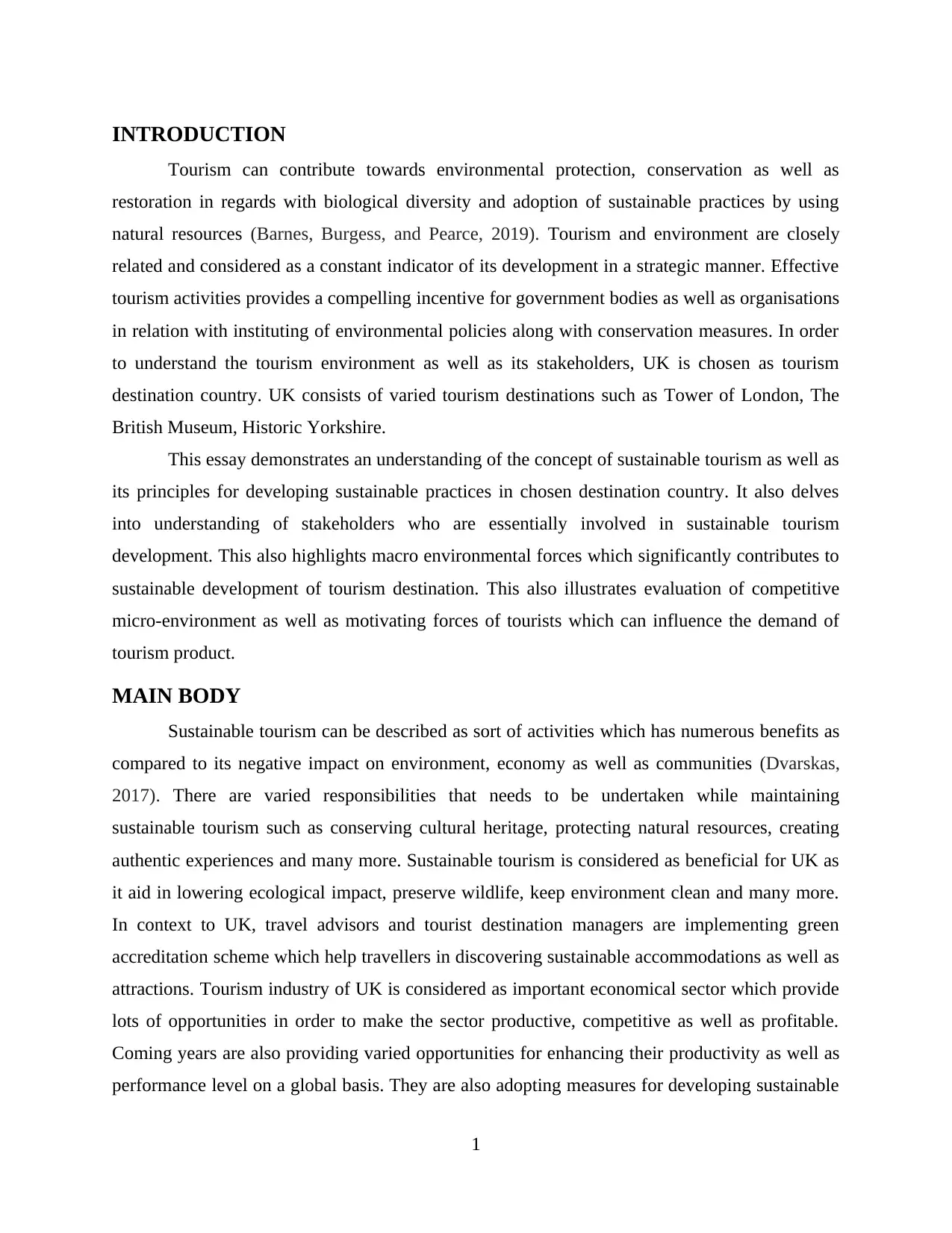
INTRODUCTION
Tourism can contribute towards environmental protection, conservation as well as
restoration in regards with biological diversity and adoption of sustainable practices by using
natural resources (Barnes, Burgess, and Pearce, 2019). Tourism and environment are closely
related and considered as a constant indicator of its development in a strategic manner. Effective
tourism activities provides a compelling incentive for government bodies as well as organisations
in relation with instituting of environmental policies along with conservation measures. In order
to understand the tourism environment as well as its stakeholders, UK is chosen as tourism
destination country. UK consists of varied tourism destinations such as Tower of London, The
British Museum, Historic Yorkshire.
This essay demonstrates an understanding of the concept of sustainable tourism as well as
its principles for developing sustainable practices in chosen destination country. It also delves
into understanding of stakeholders who are essentially involved in sustainable tourism
development. This also highlights macro environmental forces which significantly contributes to
sustainable development of tourism destination. This also illustrates evaluation of competitive
micro-environment as well as motivating forces of tourists which can influence the demand of
tourism product.
MAIN BODY
Sustainable tourism can be described as sort of activities which has numerous benefits as
compared to its negative impact on environment, economy as well as communities (Dvarskas,
2017). There are varied responsibilities that needs to be undertaken while maintaining
sustainable tourism such as conserving cultural heritage, protecting natural resources, creating
authentic experiences and many more. Sustainable tourism is considered as beneficial for UK as
it aid in lowering ecological impact, preserve wildlife, keep environment clean and many more.
In context to UK, travel advisors and tourist destination managers are implementing green
accreditation scheme which help travellers in discovering sustainable accommodations as well as
attractions. Tourism industry of UK is considered as important economical sector which provide
lots of opportunities in order to make the sector productive, competitive as well as profitable.
Coming years are also providing varied opportunities for enhancing their productivity as well as
performance level on a global basis. They are also adopting measures for developing sustainable
1
Tourism can contribute towards environmental protection, conservation as well as
restoration in regards with biological diversity and adoption of sustainable practices by using
natural resources (Barnes, Burgess, and Pearce, 2019). Tourism and environment are closely
related and considered as a constant indicator of its development in a strategic manner. Effective
tourism activities provides a compelling incentive for government bodies as well as organisations
in relation with instituting of environmental policies along with conservation measures. In order
to understand the tourism environment as well as its stakeholders, UK is chosen as tourism
destination country. UK consists of varied tourism destinations such as Tower of London, The
British Museum, Historic Yorkshire.
This essay demonstrates an understanding of the concept of sustainable tourism as well as
its principles for developing sustainable practices in chosen destination country. It also delves
into understanding of stakeholders who are essentially involved in sustainable tourism
development. This also highlights macro environmental forces which significantly contributes to
sustainable development of tourism destination. This also illustrates evaluation of competitive
micro-environment as well as motivating forces of tourists which can influence the demand of
tourism product.
MAIN BODY
Sustainable tourism can be described as sort of activities which has numerous benefits as
compared to its negative impact on environment, economy as well as communities (Dvarskas,
2017). There are varied responsibilities that needs to be undertaken while maintaining
sustainable tourism such as conserving cultural heritage, protecting natural resources, creating
authentic experiences and many more. Sustainable tourism is considered as beneficial for UK as
it aid in lowering ecological impact, preserve wildlife, keep environment clean and many more.
In context to UK, travel advisors and tourist destination managers are implementing green
accreditation scheme which help travellers in discovering sustainable accommodations as well as
attractions. Tourism industry of UK is considered as important economical sector which provide
lots of opportunities in order to make the sector productive, competitive as well as profitable.
Coming years are also providing varied opportunities for enhancing their productivity as well as
performance level on a global basis. They are also adopting measures for developing sustainable
1
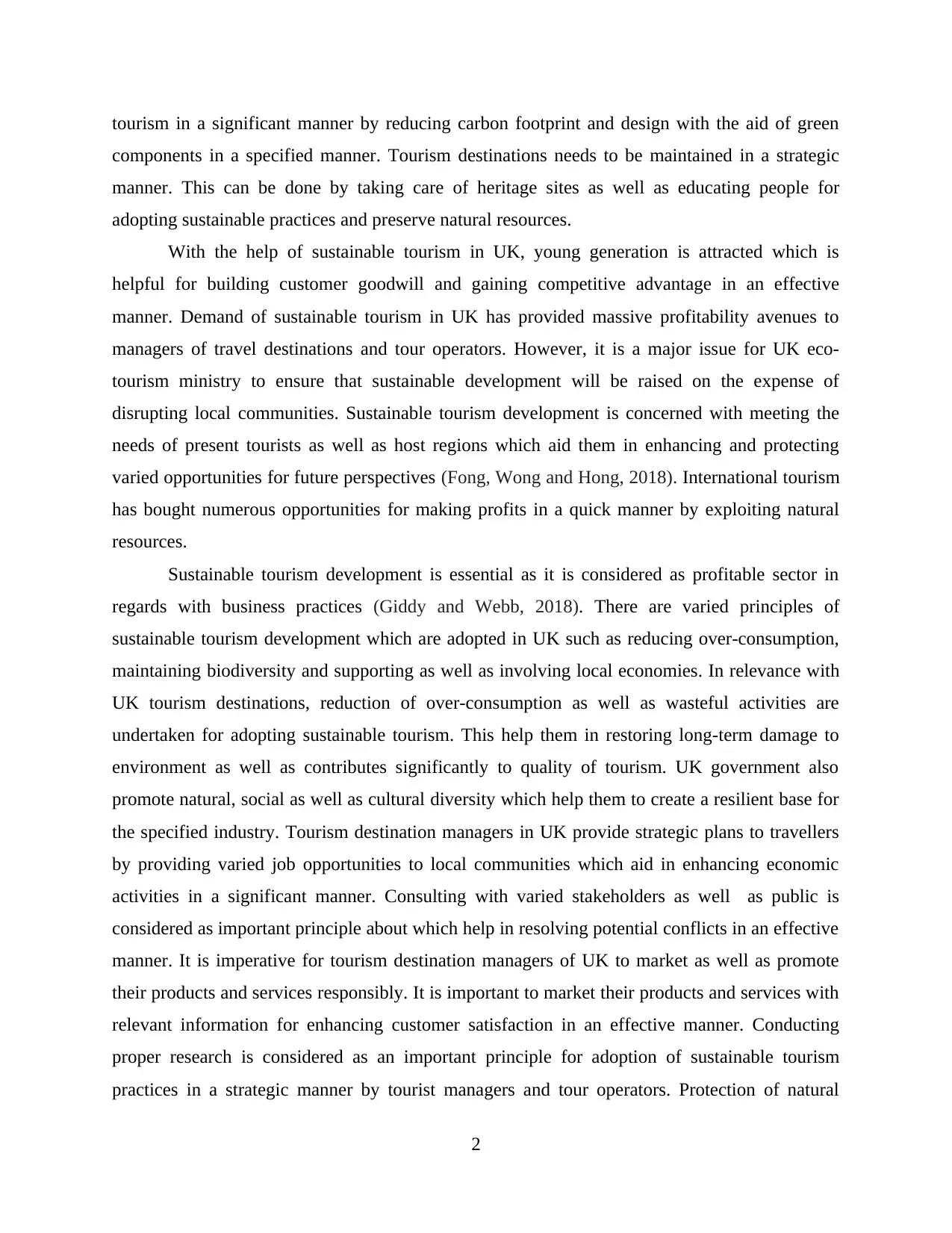
tourism in a significant manner by reducing carbon footprint and design with the aid of green
components in a specified manner. Tourism destinations needs to be maintained in a strategic
manner. This can be done by taking care of heritage sites as well as educating people for
adopting sustainable practices and preserve natural resources.
With the help of sustainable tourism in UK, young generation is attracted which is
helpful for building customer goodwill and gaining competitive advantage in an effective
manner. Demand of sustainable tourism in UK has provided massive profitability avenues to
managers of travel destinations and tour operators. However, it is a major issue for UK eco-
tourism ministry to ensure that sustainable development will be raised on the expense of
disrupting local communities. Sustainable tourism development is concerned with meeting the
needs of present tourists as well as host regions which aid them in enhancing and protecting
varied opportunities for future perspectives (Fong, Wong and Hong, 2018). International tourism
has bought numerous opportunities for making profits in a quick manner by exploiting natural
resources.
Sustainable tourism development is essential as it is considered as profitable sector in
regards with business practices (Giddy and Webb, 2018). There are varied principles of
sustainable tourism development which are adopted in UK such as reducing over-consumption,
maintaining biodiversity and supporting as well as involving local economies. In relevance with
UK tourism destinations, reduction of over-consumption as well as wasteful activities are
undertaken for adopting sustainable tourism. This help them in restoring long-term damage to
environment as well as contributes significantly to quality of tourism. UK government also
promote natural, social as well as cultural diversity which help them to create a resilient base for
the specified industry. Tourism destination managers in UK provide strategic plans to travellers
by providing varied job opportunities to local communities which aid in enhancing economic
activities in a significant manner. Consulting with varied stakeholders as well as public is
considered as important principle about which help in resolving potential conflicts in an effective
manner. It is imperative for tourism destination managers of UK to market as well as promote
their products and services responsibly. It is important to market their products and services with
relevant information for enhancing customer satisfaction in an effective manner. Conducting
proper research is considered as an important principle for adoption of sustainable tourism
practices in a strategic manner by tourist managers and tour operators. Protection of natural
2
components in a specified manner. Tourism destinations needs to be maintained in a strategic
manner. This can be done by taking care of heritage sites as well as educating people for
adopting sustainable practices and preserve natural resources.
With the help of sustainable tourism in UK, young generation is attracted which is
helpful for building customer goodwill and gaining competitive advantage in an effective
manner. Demand of sustainable tourism in UK has provided massive profitability avenues to
managers of travel destinations and tour operators. However, it is a major issue for UK eco-
tourism ministry to ensure that sustainable development will be raised on the expense of
disrupting local communities. Sustainable tourism development is concerned with meeting the
needs of present tourists as well as host regions which aid them in enhancing and protecting
varied opportunities for future perspectives (Fong, Wong and Hong, 2018). International tourism
has bought numerous opportunities for making profits in a quick manner by exploiting natural
resources.
Sustainable tourism development is essential as it is considered as profitable sector in
regards with business practices (Giddy and Webb, 2018). There are varied principles of
sustainable tourism development which are adopted in UK such as reducing over-consumption,
maintaining biodiversity and supporting as well as involving local economies. In relevance with
UK tourism destinations, reduction of over-consumption as well as wasteful activities are
undertaken for adopting sustainable tourism. This help them in restoring long-term damage to
environment as well as contributes significantly to quality of tourism. UK government also
promote natural, social as well as cultural diversity which help them to create a resilient base for
the specified industry. Tourism destination managers in UK provide strategic plans to travellers
by providing varied job opportunities to local communities which aid in enhancing economic
activities in a significant manner. Consulting with varied stakeholders as well as public is
considered as important principle about which help in resolving potential conflicts in an effective
manner. It is imperative for tourism destination managers of UK to market as well as promote
their products and services responsibly. It is important to market their products and services with
relevant information for enhancing customer satisfaction in an effective manner. Conducting
proper research is considered as an important principle for adoption of sustainable tourism
practices in a strategic manner by tourist managers and tour operators. Protection of natural
2
Secure Best Marks with AI Grader
Need help grading? Try our AI Grader for instant feedback on your assignments.
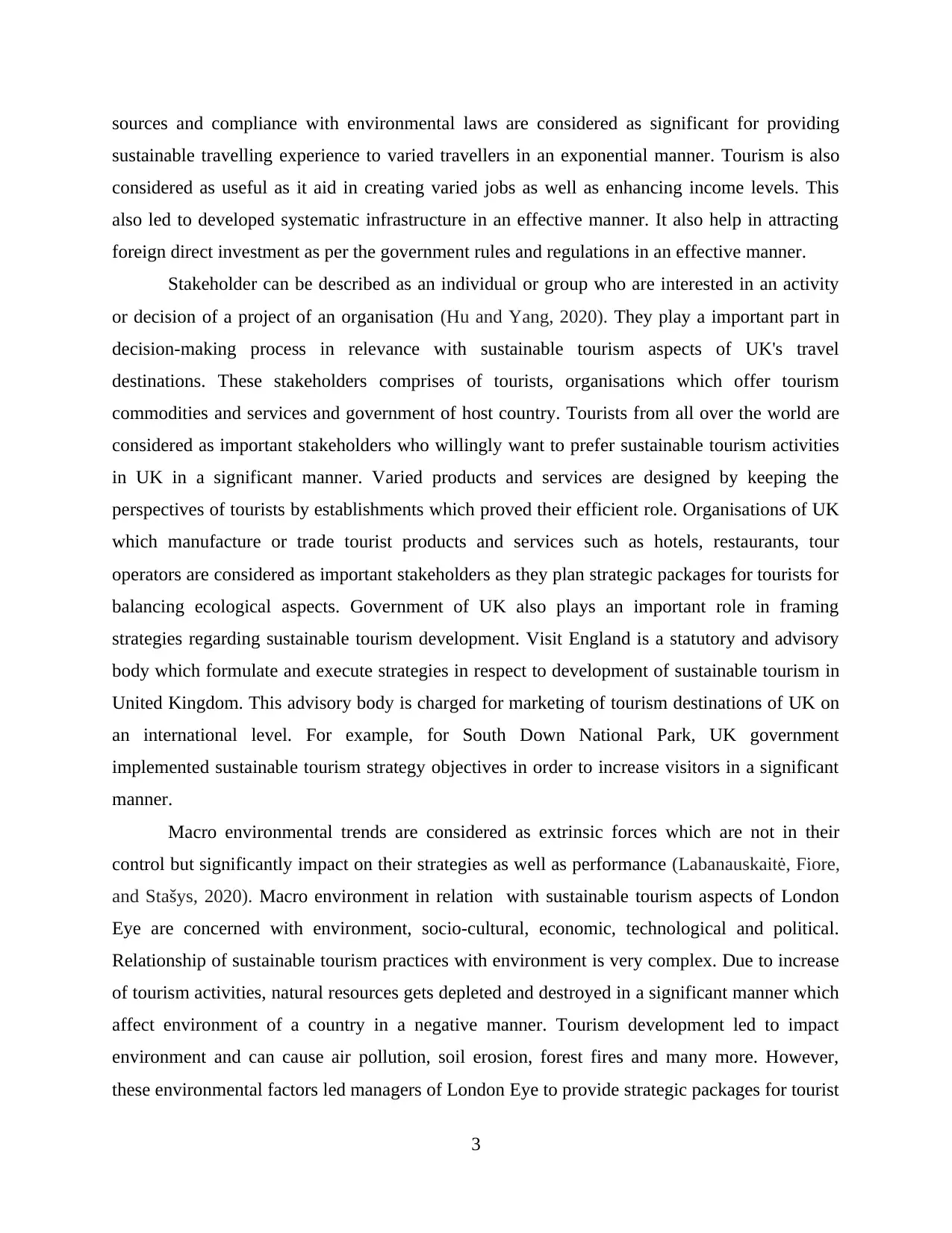
sources and compliance with environmental laws are considered as significant for providing
sustainable travelling experience to varied travellers in an exponential manner. Tourism is also
considered as useful as it aid in creating varied jobs as well as enhancing income levels. This
also led to developed systematic infrastructure in an effective manner. It also help in attracting
foreign direct investment as per the government rules and regulations in an effective manner.
Stakeholder can be described as an individual or group who are interested in an activity
or decision of a project of an organisation (Hu and Yang, 2020). They play a important part in
decision-making process in relevance with sustainable tourism aspects of UK's travel
destinations. These stakeholders comprises of tourists, organisations which offer tourism
commodities and services and government of host country. Tourists from all over the world are
considered as important stakeholders who willingly want to prefer sustainable tourism activities
in UK in a significant manner. Varied products and services are designed by keeping the
perspectives of tourists by establishments which proved their efficient role. Organisations of UK
which manufacture or trade tourist products and services such as hotels, restaurants, tour
operators are considered as important stakeholders as they plan strategic packages for tourists for
balancing ecological aspects. Government of UK also plays an important role in framing
strategies regarding sustainable tourism development. Visit England is a statutory and advisory
body which formulate and execute strategies in respect to development of sustainable tourism in
United Kingdom. This advisory body is charged for marketing of tourism destinations of UK on
an international level. For example, for South Down National Park, UK government
implemented sustainable tourism strategy objectives in order to increase visitors in a significant
manner.
Macro environmental trends are considered as extrinsic forces which are not in their
control but significantly impact on their strategies as well as performance (Labanauskaitė, Fiore,
and Stašys, 2020). Macro environment in relation with sustainable tourism aspects of London
Eye are concerned with environment, socio-cultural, economic, technological and political.
Relationship of sustainable tourism practices with environment is very complex. Due to increase
of tourism activities, natural resources gets depleted and destroyed in a significant manner which
affect environment of a country in a negative manner. Tourism development led to impact
environment and can cause air pollution, soil erosion, forest fires and many more. However,
these environmental factors led managers of London Eye to provide strategic packages for tourist
3
sustainable travelling experience to varied travellers in an exponential manner. Tourism is also
considered as useful as it aid in creating varied jobs as well as enhancing income levels. This
also led to developed systematic infrastructure in an effective manner. It also help in attracting
foreign direct investment as per the government rules and regulations in an effective manner.
Stakeholder can be described as an individual or group who are interested in an activity
or decision of a project of an organisation (Hu and Yang, 2020). They play a important part in
decision-making process in relevance with sustainable tourism aspects of UK's travel
destinations. These stakeholders comprises of tourists, organisations which offer tourism
commodities and services and government of host country. Tourists from all over the world are
considered as important stakeholders who willingly want to prefer sustainable tourism activities
in UK in a significant manner. Varied products and services are designed by keeping the
perspectives of tourists by establishments which proved their efficient role. Organisations of UK
which manufacture or trade tourist products and services such as hotels, restaurants, tour
operators are considered as important stakeholders as they plan strategic packages for tourists for
balancing ecological aspects. Government of UK also plays an important role in framing
strategies regarding sustainable tourism development. Visit England is a statutory and advisory
body which formulate and execute strategies in respect to development of sustainable tourism in
United Kingdom. This advisory body is charged for marketing of tourism destinations of UK on
an international level. For example, for South Down National Park, UK government
implemented sustainable tourism strategy objectives in order to increase visitors in a significant
manner.
Macro environmental trends are considered as extrinsic forces which are not in their
control but significantly impact on their strategies as well as performance (Labanauskaitė, Fiore,
and Stašys, 2020). Macro environment in relation with sustainable tourism aspects of London
Eye are concerned with environment, socio-cultural, economic, technological and political.
Relationship of sustainable tourism practices with environment is very complex. Due to increase
of tourism activities, natural resources gets depleted and destroyed in a significant manner which
affect environment of a country in a negative manner. Tourism development led to impact
environment and can cause air pollution, soil erosion, forest fires and many more. However,
these environmental factors led managers of London Eye to provide strategic packages for tourist
3
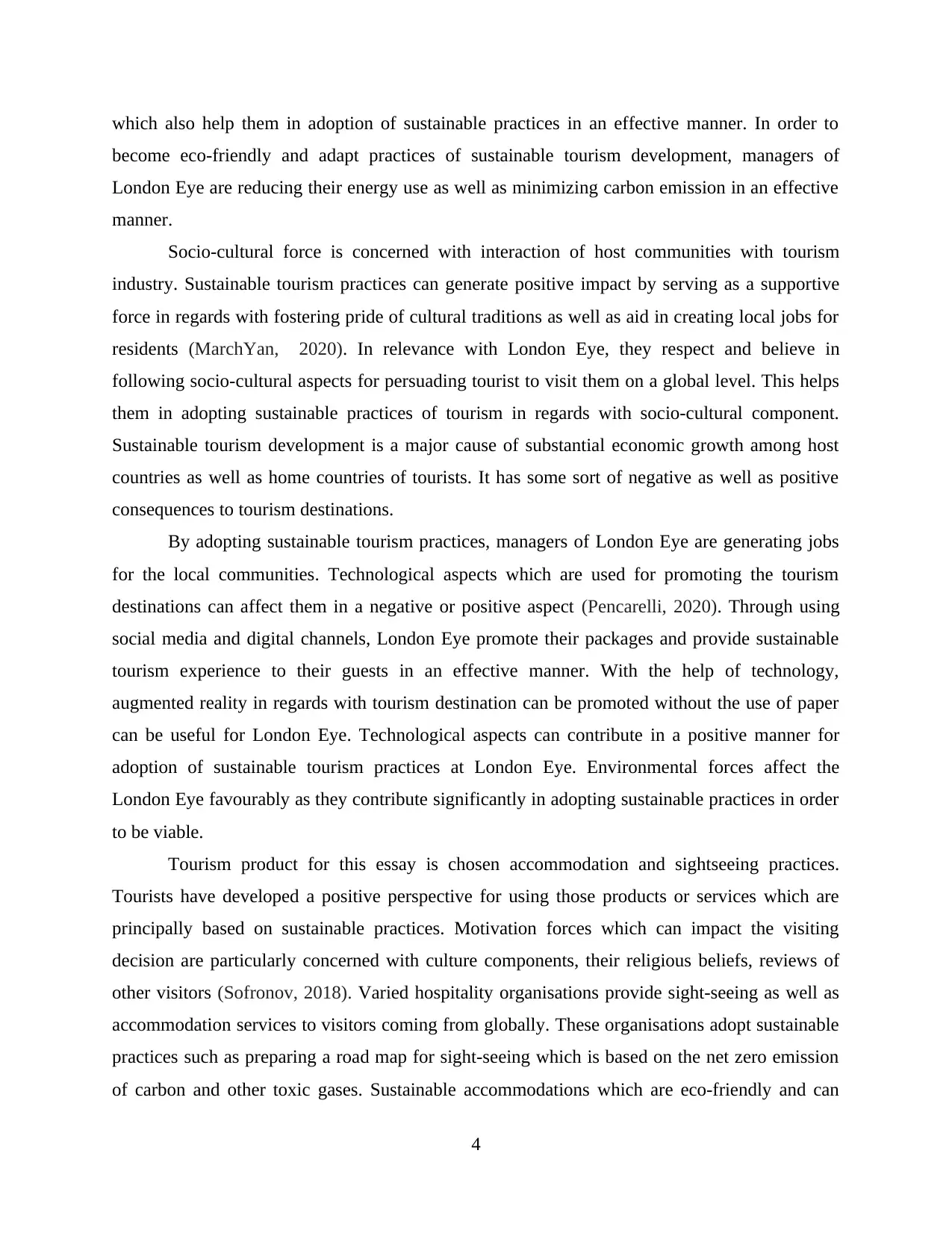
which also help them in adoption of sustainable practices in an effective manner. In order to
become eco-friendly and adapt practices of sustainable tourism development, managers of
London Eye are reducing their energy use as well as minimizing carbon emission in an effective
manner.
Socio-cultural force is concerned with interaction of host communities with tourism
industry. Sustainable tourism practices can generate positive impact by serving as a supportive
force in regards with fostering pride of cultural traditions as well as aid in creating local jobs for
residents (MarchYan, 2020). In relevance with London Eye, they respect and believe in
following socio-cultural aspects for persuading tourist to visit them on a global level. This helps
them in adopting sustainable practices of tourism in regards with socio-cultural component.
Sustainable tourism development is a major cause of substantial economic growth among host
countries as well as home countries of tourists. It has some sort of negative as well as positive
consequences to tourism destinations.
By adopting sustainable tourism practices, managers of London Eye are generating jobs
for the local communities. Technological aspects which are used for promoting the tourism
destinations can affect them in a negative or positive aspect (Pencarelli, 2020). Through using
social media and digital channels, London Eye promote their packages and provide sustainable
tourism experience to their guests in an effective manner. With the help of technology,
augmented reality in regards with tourism destination can be promoted without the use of paper
can be useful for London Eye. Technological aspects can contribute in a positive manner for
adoption of sustainable tourism practices at London Eye. Environmental forces affect the
London Eye favourably as they contribute significantly in adopting sustainable practices in order
to be viable.
Tourism product for this essay is chosen accommodation and sightseeing practices.
Tourists have developed a positive perspective for using those products or services which are
principally based on sustainable practices. Motivation forces which can impact the visiting
decision are particularly concerned with culture components, their religious beliefs, reviews of
other visitors (Sofronov, 2018). Varied hospitality organisations provide sight-seeing as well as
accommodation services to visitors coming from globally. These organisations adopt sustainable
practices such as preparing a road map for sight-seeing which is based on the net zero emission
of carbon and other toxic gases. Sustainable accommodations which are eco-friendly and can
4
become eco-friendly and adapt practices of sustainable tourism development, managers of
London Eye are reducing their energy use as well as minimizing carbon emission in an effective
manner.
Socio-cultural force is concerned with interaction of host communities with tourism
industry. Sustainable tourism practices can generate positive impact by serving as a supportive
force in regards with fostering pride of cultural traditions as well as aid in creating local jobs for
residents (MarchYan, 2020). In relevance with London Eye, they respect and believe in
following socio-cultural aspects for persuading tourist to visit them on a global level. This helps
them in adopting sustainable practices of tourism in regards with socio-cultural component.
Sustainable tourism development is a major cause of substantial economic growth among host
countries as well as home countries of tourists. It has some sort of negative as well as positive
consequences to tourism destinations.
By adopting sustainable tourism practices, managers of London Eye are generating jobs
for the local communities. Technological aspects which are used for promoting the tourism
destinations can affect them in a negative or positive aspect (Pencarelli, 2020). Through using
social media and digital channels, London Eye promote their packages and provide sustainable
tourism experience to their guests in an effective manner. With the help of technology,
augmented reality in regards with tourism destination can be promoted without the use of paper
can be useful for London Eye. Technological aspects can contribute in a positive manner for
adoption of sustainable tourism practices at London Eye. Environmental forces affect the
London Eye favourably as they contribute significantly in adopting sustainable practices in order
to be viable.
Tourism product for this essay is chosen accommodation and sightseeing practices.
Tourists have developed a positive perspective for using those products or services which are
principally based on sustainable practices. Motivation forces which can impact the visiting
decision are particularly concerned with culture components, their religious beliefs, reviews of
other visitors (Sofronov, 2018). Varied hospitality organisations provide sight-seeing as well as
accommodation services to visitors coming from globally. These organisations adopt sustainable
practices such as preparing a road map for sight-seeing which is based on the net zero emission
of carbon and other toxic gases. Sustainable accommodations which are eco-friendly and can
4
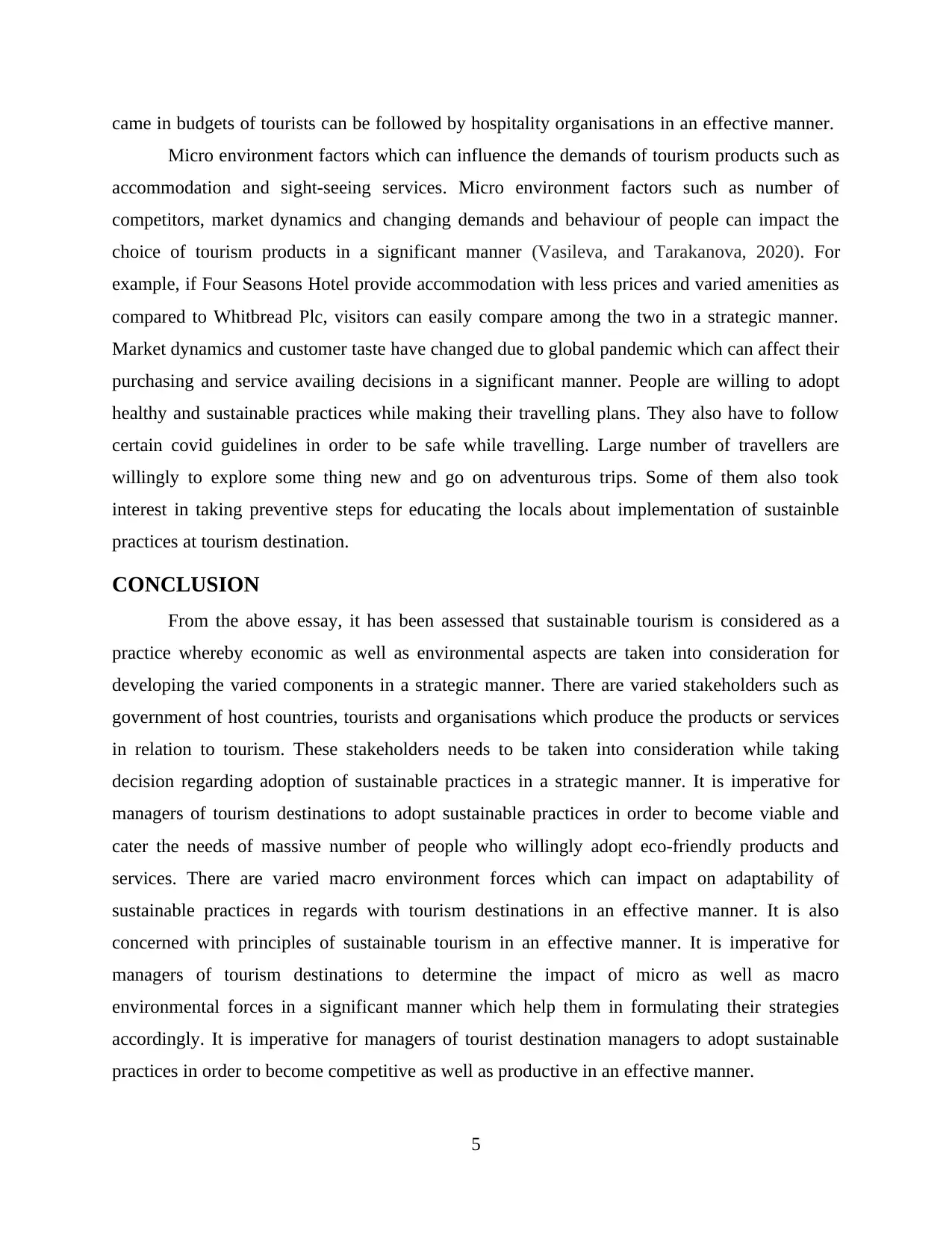
came in budgets of tourists can be followed by hospitality organisations in an effective manner.
Micro environment factors which can influence the demands of tourism products such as
accommodation and sight-seeing services. Micro environment factors such as number of
competitors, market dynamics and changing demands and behaviour of people can impact the
choice of tourism products in a significant manner (Vasileva, and Tarakanova, 2020). For
example, if Four Seasons Hotel provide accommodation with less prices and varied amenities as
compared to Whitbread Plc, visitors can easily compare among the two in a strategic manner.
Market dynamics and customer taste have changed due to global pandemic which can affect their
purchasing and service availing decisions in a significant manner. People are willing to adopt
healthy and sustainable practices while making their travelling plans. They also have to follow
certain covid guidelines in order to be safe while travelling. Large number of travellers are
willingly to explore some thing new and go on adventurous trips. Some of them also took
interest in taking preventive steps for educating the locals about implementation of sustainble
practices at tourism destination.
CONCLUSION
From the above essay, it has been assessed that sustainable tourism is considered as a
practice whereby economic as well as environmental aspects are taken into consideration for
developing the varied components in a strategic manner. There are varied stakeholders such as
government of host countries, tourists and organisations which produce the products or services
in relation to tourism. These stakeholders needs to be taken into consideration while taking
decision regarding adoption of sustainable practices in a strategic manner. It is imperative for
managers of tourism destinations to adopt sustainable practices in order to become viable and
cater the needs of massive number of people who willingly adopt eco-friendly products and
services. There are varied macro environment forces which can impact on adaptability of
sustainable practices in regards with tourism destinations in an effective manner. It is also
concerned with principles of sustainable tourism in an effective manner. It is imperative for
managers of tourism destinations to determine the impact of micro as well as macro
environmental forces in a significant manner which help them in formulating their strategies
accordingly. It is imperative for managers of tourist destination managers to adopt sustainable
practices in order to become competitive as well as productive in an effective manner.
5
Micro environment factors which can influence the demands of tourism products such as
accommodation and sight-seeing services. Micro environment factors such as number of
competitors, market dynamics and changing demands and behaviour of people can impact the
choice of tourism products in a significant manner (Vasileva, and Tarakanova, 2020). For
example, if Four Seasons Hotel provide accommodation with less prices and varied amenities as
compared to Whitbread Plc, visitors can easily compare among the two in a strategic manner.
Market dynamics and customer taste have changed due to global pandemic which can affect their
purchasing and service availing decisions in a significant manner. People are willing to adopt
healthy and sustainable practices while making their travelling plans. They also have to follow
certain covid guidelines in order to be safe while travelling. Large number of travellers are
willingly to explore some thing new and go on adventurous trips. Some of them also took
interest in taking preventive steps for educating the locals about implementation of sustainble
practices at tourism destination.
CONCLUSION
From the above essay, it has been assessed that sustainable tourism is considered as a
practice whereby economic as well as environmental aspects are taken into consideration for
developing the varied components in a strategic manner. There are varied stakeholders such as
government of host countries, tourists and organisations which produce the products or services
in relation to tourism. These stakeholders needs to be taken into consideration while taking
decision regarding adoption of sustainable practices in a strategic manner. It is imperative for
managers of tourism destinations to adopt sustainable practices in order to become viable and
cater the needs of massive number of people who willingly adopt eco-friendly products and
services. There are varied macro environment forces which can impact on adaptability of
sustainable practices in regards with tourism destinations in an effective manner. It is also
concerned with principles of sustainable tourism in an effective manner. It is imperative for
managers of tourism destinations to determine the impact of micro as well as macro
environmental forces in a significant manner which help them in formulating their strategies
accordingly. It is imperative for managers of tourist destination managers to adopt sustainable
practices in order to become competitive as well as productive in an effective manner.
5
Paraphrase This Document
Need a fresh take? Get an instant paraphrase of this document with our AI Paraphraser
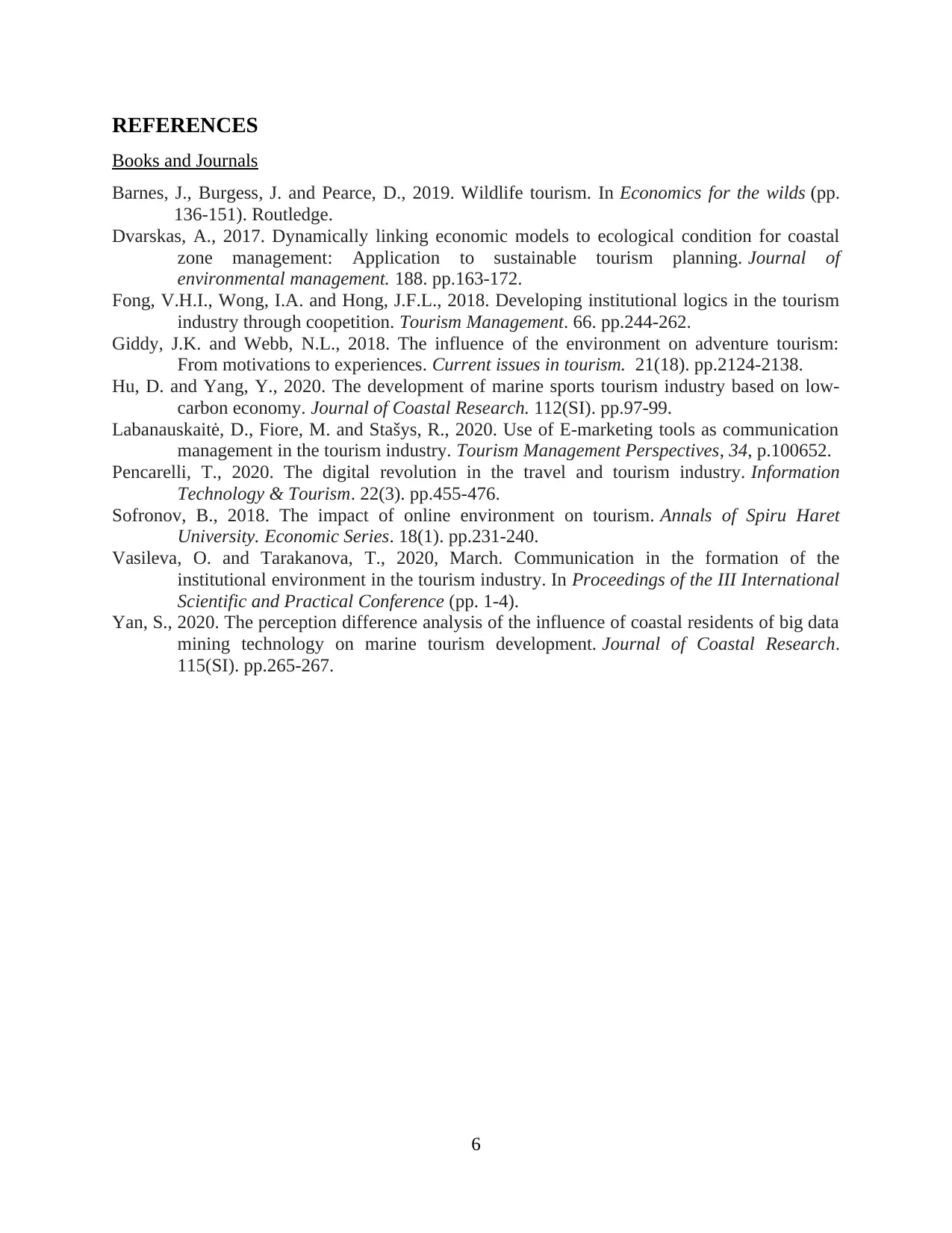
REFERENCES
Books and Journals
Barnes, J., Burgess, J. and Pearce, D., 2019. Wildlife tourism. In Economics for the wilds (pp.
136-151). Routledge.
Dvarskas, A., 2017. Dynamically linking economic models to ecological condition for coastal
zone management: Application to sustainable tourism planning. Journal of
environmental management. 188. pp.163-172.
Fong, V.H.I., Wong, I.A. and Hong, J.F.L., 2018. Developing institutional logics in the tourism
industry through coopetition. Tourism Management. 66. pp.244-262.
Giddy, J.K. and Webb, N.L., 2018. The influence of the environment on adventure tourism:
From motivations to experiences. Current issues in tourism. 21(18). pp.2124-2138.
Hu, D. and Yang, Y., 2020. The development of marine sports tourism industry based on low-
carbon economy. Journal of Coastal Research. 112(SI). pp.97-99.
Labanauskaitė, D., Fiore, M. and Stašys, R., 2020. Use of E-marketing tools as communication
management in the tourism industry. Tourism Management Perspectives, 34, p.100652.
Pencarelli, T., 2020. The digital revolution in the travel and tourism industry. Information
Technology & Tourism. 22(3). pp.455-476.
Sofronov, B., 2018. The impact of online environment on tourism. Annals of Spiru Haret
University. Economic Series. 18(1). pp.231-240.
Vasileva, O. and Tarakanova, T., 2020, March. Communication in the formation of the
institutional environment in the tourism industry. In Proceedings of the III International
Scientific and Practical Conference (pp. 1-4).
Yan, S., 2020. The perception difference analysis of the influence of coastal residents of big data
mining technology on marine tourism development. Journal of Coastal Research.
115(SI). pp.265-267.
6
Books and Journals
Barnes, J., Burgess, J. and Pearce, D., 2019. Wildlife tourism. In Economics for the wilds (pp.
136-151). Routledge.
Dvarskas, A., 2017. Dynamically linking economic models to ecological condition for coastal
zone management: Application to sustainable tourism planning. Journal of
environmental management. 188. pp.163-172.
Fong, V.H.I., Wong, I.A. and Hong, J.F.L., 2018. Developing institutional logics in the tourism
industry through coopetition. Tourism Management. 66. pp.244-262.
Giddy, J.K. and Webb, N.L., 2018. The influence of the environment on adventure tourism:
From motivations to experiences. Current issues in tourism. 21(18). pp.2124-2138.
Hu, D. and Yang, Y., 2020. The development of marine sports tourism industry based on low-
carbon economy. Journal of Coastal Research. 112(SI). pp.97-99.
Labanauskaitė, D., Fiore, M. and Stašys, R., 2020. Use of E-marketing tools as communication
management in the tourism industry. Tourism Management Perspectives, 34, p.100652.
Pencarelli, T., 2020. The digital revolution in the travel and tourism industry. Information
Technology & Tourism. 22(3). pp.455-476.
Sofronov, B., 2018. The impact of online environment on tourism. Annals of Spiru Haret
University. Economic Series. 18(1). pp.231-240.
Vasileva, O. and Tarakanova, T., 2020, March. Communication in the formation of the
institutional environment in the tourism industry. In Proceedings of the III International
Scientific and Practical Conference (pp. 1-4).
Yan, S., 2020. The perception difference analysis of the influence of coastal residents of big data
mining technology on marine tourism development. Journal of Coastal Research.
115(SI). pp.265-267.
6
1 out of 8
Related Documents
Your All-in-One AI-Powered Toolkit for Academic Success.
+13062052269
info@desklib.com
Available 24*7 on WhatsApp / Email
![[object Object]](/_next/static/media/star-bottom.7253800d.svg)
Unlock your academic potential
© 2024 | Zucol Services PVT LTD | All rights reserved.



